Transgenic mice harboring SV40 T-antigen genes develop characteristic brain tumors
- PMID: 6327063
- PMCID: PMC4889224
- DOI: 10.1016/0092-8674(84)90367-2
Transgenic mice harboring SV40 T-antigen genes develop characteristic brain tumors
Abstract
A high percentage of transgenic mice developing from eggs microinjected with plasmids containing the SV40 early region genes and a metallothionein fusion gene develop tumors within the choroid plexus. A line of mice has been established in which nearly every affected animal succumbs to this brain tumor. Thymic hypertrophy and kidney pathology are also observed in some mice. SV40 T-antigen mRNA and protein are readily detected in affected tissues; however, SV40 T-antigen gene expression is barely detectable in unaffected tissues or in susceptible tissues prior to overt pathology, suggesting that tumorigenesis depends upon activation of the SV40 genes. Comparison of DNA from tumor tissue (or cell lines derived from tumors) with DNA from unaffected tissues reveals structural rearrangements as well as changes in DNA methylation of the foreign DNA. The SV40 genes are frequently amplified in tumor tissue, which further indicates that their expression is intimately involved in tumorigenesis in transgenic mice.
Figures

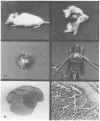

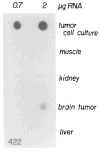


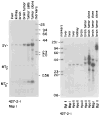
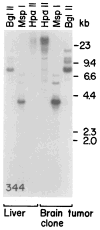
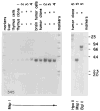
References
-
- Abramczuk J. Attempts of permanent introduction of SV40 genome into mouse gametes and early embryos. In: Nagley P, Linnane AW, Peacock WJ, Pateman JA, editors. Manipulation and Expression of Genes in Eukaryotes. New York: Academic Press; 1983. pp. 355–356.
-
- Bishop JM. Cellular oncogenes and retroviruses. Ann Rev Biochem. 1983;52:301–354. - PubMed
Publication types
MeSH terms
Substances
Grants and funding
LinkOut - more resources
Full Text Sources
Other Literature Sources
Medical
Molecular Biology Databases

